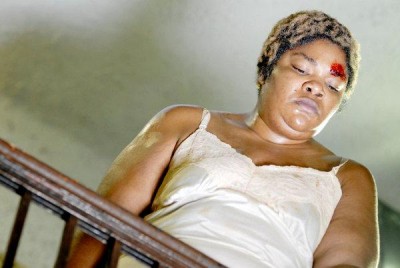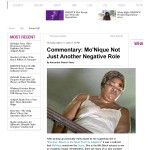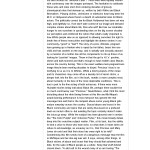 After picking up practically every award for her supporting role in “Precious: Based on the Novel ‘Push’ by Sapphire,” it was a safe bet that Mo’Nique would win the Oscar. She is the fifth Black actress to win an Academy Award. Nevertheless, there are many of us who consider Mo’Nique’s Oscar win to be just another “negative” role earning recognition. In fact, many ESSENCE.com readers have gone as far as expressing shame and disgust. Some have even flat out refused to ever watch Lee Daniel’s Oscar-nominated film. This isn’t the first time an Oscar win has incited Black audiences to vocalize their deep dissatisfaction and discomfort with the Black characters and narratives Hollywood deems award-worthy. Remember Denzel Washington winning the best actor award for “Training Day” or Halle Berry winning the best actress for “Monster’s Ball”? Those wins were equally marred with controversy over the images portrayed. The hesitation to celebrate these wins and roles stem from enduring decades of grossly stereotypical roles that demean us, written by both White and Black filmmakers. Playing victims, victimizers or sidekicks have long been the M.O. in Hollywood where there’s a dearth of substantial roles for Black actors. The politically correct bar for Black Hollywood has been set very high, and rightfully so. If we don’t take control of our image and demand complex stories about Black life, then who will? But has our insatiable hunger to see ourselves in upstanding roles on the big screen clouded our perception and reinforced the notion that what’s really important is how White people view us as opposed to allowing ourselves the right to break free of these insecurities and highlight the diverse stories in our community–“good” or “bad”?
After picking up practically every award for her supporting role in “Precious: Based on the Novel ‘Push’ by Sapphire,” it was a safe bet that Mo’Nique would win the Oscar. She is the fifth Black actress to win an Academy Award. Nevertheless, there are many of us who consider Mo’Nique’s Oscar win to be just another “negative” role earning recognition. In fact, many ESSENCE.com readers have gone as far as expressing shame and disgust. Some have even flat out refused to ever watch Lee Daniel’s Oscar-nominated film. This isn’t the first time an Oscar win has incited Black audiences to vocalize their deep dissatisfaction and discomfort with the Black characters and narratives Hollywood deems award-worthy. Remember Denzel Washington winning the best actor award for “Training Day” or Halle Berry winning the best actress for “Monster’s Ball”? Those wins were equally marred with controversy over the images portrayed. The hesitation to celebrate these wins and roles stem from enduring decades of grossly stereotypical roles that demean us, written by both White and Black filmmakers. Playing victims, victimizers or sidekicks have long been the M.O. in Hollywood where there’s a dearth of substantial roles for Black actors. The politically correct bar for Black Hollywood has been set very high, and rightfully so. If we don’t take control of our image and demand complex stories about Black life, then who will? But has our insatiable hunger to see ourselves in upstanding roles on the big screen clouded our perception and reinforced the notion that what’s really important is how White people view us as opposed to allowing ourselves the right to break free of these insecurities and highlight the diverse stories in our community–“good” or “bad”?
The story of a poor, illiterate, pregnant teen growing up in Harlem who is raped by her father, bears him one child and has another on the way, and is verbally and sexually abused by a monster of a mother has all the components to rile up those of us looking for “positive” images. Throw in that the girl is H.I.V. positive, obese and dark-skinned and that’s enough to have middle class Blacks across the country fuming. This is the exact welfare-mom-pregnant-teen image they’ve been working decades to dispel. Precious’ story is as terrifying to us as it is to Whites. While a brief synopsis of the movie and its characters may come off as a laundry list of racist clichs, a deeper look into the film, as in the book, reveals a more complex story about humanity in the face of the most deplorable conditions. This is due in part to the fine acting of both actresses. If there were more Huxtable stories being told about Black life, perhaps there wouldn’t be so much controversy over “Precious.” Nevertheless, what I find the most disturbing about the vitriol being thrown at this film and Mo’Nique’s award-winning performance is how everyone has ignored the real message here and that is the rampant abuse some young Black girls endure everyday across the country. Sexual abuse and incest in the Black community are topics that are rarely discussed on a profound level–as racism often is–but avoiding the topic certainly doesn’t make the issue go away. While the subject has been glossed over in movies like “The Color Purple” and “Antwone Fisher,” this movie bravely delves deep into this sensitive subject matter.
Film, at its best, has the ability to lend a voice to those who have none, so what does it mean when we refuse to acknowledge, as unsavory as it is, that Precious and Mary Jones do exist and that their story has every right to be told?
Mo’Nique’s tour-de-force performance in that lone scene is what deservingly won her that Oscar. Mo’Nique managed to draw both sympathy and disgust from viewers. In that moment, you reluctantly feel the pain of this horrid woman. It left me feeling a bit nauseous and wishing I could press pause. Is that not what fine acting should be about? In Tony Morrison’s latest edition of “Sula” (in the foreword), she makes a very real point that I believe speaks not only to her’s but to many other Black artists’ experiences. Essentially, she asks how can she, as a Black woman artist, not simply be regarded for her message but also for the aesthetics of her work. It’s unfortunate that those offended by the message in the movie can’t let themselves experience the aesthetics of, by far, the most visceral performance of all those nominated this year. The root of the “Precious” debate really lies in the fact that Hollywood has long been stuck in their one-dimensional idea of Black life. I think it’s fair to say that those of us who argue that “Precious” is a horror show that needs to be ignored are doing their share in pushing that destructive notion of only one Black experience forward.
Link
Essence.com – Commentary: Mo’Nique Not Just Another Negative Role
Website Preview
- Write of Passage - October 28, 2013
- Old School Mood Boards - June 17, 2013
- Chloe Resort 2014 - June 12, 2013








